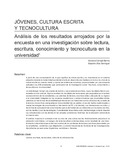Jóvenes, cultura escrita y tecno cultura: análisis de los resultados arrojados por la encuesta en una investigación sobre lectura, escritura, conocimiento y tecnocultura en la universidad
Compartir este ítem
Fecha
2005-06-30Autor
Carvajal Barrios, Giovanna; Universidad del Valle
Citación
Metadatos
Mostrar el registro completo del ítemDocumentos PDF
Resumen
Parting from a conceptualization of what the written culture means and its importance over the educationalsystems during the Western Modernity, this article develops a hypothesis around the crisis of the writtenculture in our surroundings; and it brings forth empirical evidences provided by a survey on the 259students who had participated in the research over “Writing, knowledge, and techno-culture on campus.”The methodology includes a reading test and a writing test, the results of which were disclosed in anotherarticle. This one, on the other hand, analyses the survey that asked about the students’ socio-economicalclass, their reading and writing practices before and after being admitted to the university. It furthermoreinquired about the academic and extra-curricular spaces such practices provided; about the kinds ofsociability that favored their relationship with the written culture through reading and writing; it verifiedthe educational level of their parents, the usage of audiovisual means and new communication andinformation technologies (PC and internet), their interactions with them, and their ways of acquiring thoseknowledges that derive from their relationship with written texts, the media, and technologies. Consideringwriting as a technology, this text shows its articulations with the others in the current historical conditionsof college education in our country.The analysis shows the contrast between the crisis of a written culture, historically precarious in theColombian education, and the rising of the contemporaneous techno-culture, as a result of a culturaltransformation from which many of the reading and writing problems on behalf of the students are derived,problems the diagnosis and solutions of which transcend the boundaries of disciplinary researches, bethey linguistical, semiotic, or literary. A partir de una conceptuación de lo que significa la cultura escrita y su importancia en el sistema educativo durante la modernidad occidental el artículo desarrolla una hipótesis en torno a la crisis de la cultura escrita en nuestro medio, y aporta las evidencias empíricas proporcionadas por una encuesta aplicada a los 256 estudiantes que participaron de la investigación sobre “Escritura, conocimiento y tecnocultura en la universidad”.La metodología incluyó una prueba de lectura y una prueba de escritura, cuyos resultados fueron presentados en otro artículo. Aquí se analizan los resultados de la encuesta que preguntaba por el estrato socioeconómico de los estudiantes, sus prácticas de lectura y escritura antes y después de su ingreso a la universidad; indagaba por los espacios académicos y extracurriculares que propiciaban dichas prácticas por las formas de sociabilidad que favorecían sus relaciones con la cultura escrita, a través de la lectura y la escritura, averiguaba por la escolaridad de sus padres, el uso de medios audiovisuales y nuevas tecnologías de comunicación e información (el PC y la Internet), sus interacciones con ellos, y las formas de apropiación de conocimientos que se derivaban de sus relaciones con los textos escritos, con los medios y con las tecnologías. Considerando la escritura como una tecnología, el texto muestra sus articulaciones con las demás en las actuales condiciones históricas de la educación universitaria en nuestro país.El análisis muestra el contraste entre la crisis de una cultura escrita, históricamente precaria en la educación colombiana, y el apogeo de la tecnocultura contemporánea, como resultado de una transformación cultural de la que se derivan muchos de los problemas de lectura y escritura presentados por los estudiantes, problemas cuyo diagnóstico y solución trasciende las fronteras de las investigaciones disciplinarias ya sean estas lingüísticas, semióticas o literarias.


